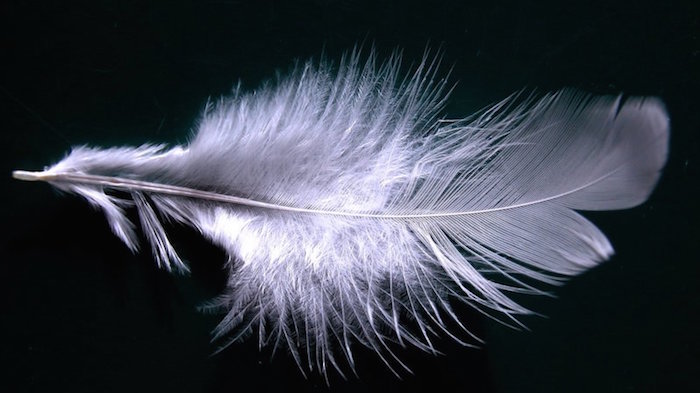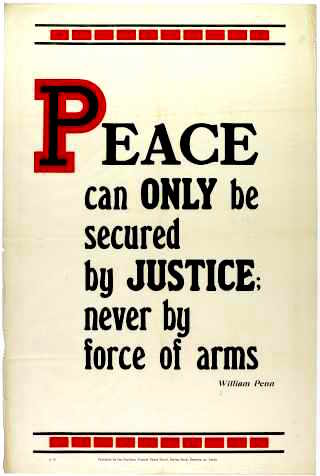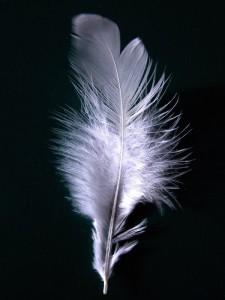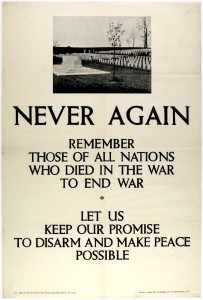
The Northern Friends Peace Board was founded by Quakers in the north of England in 1913 and still exists today as a witness for global peace. Zephyrine Barbarachild describes the context in which the Board was founded and the role of women in peace activism during World War 1.
Northern Friends Peace Board Women
Posted by Zephyrine Barbarachild

NFPB poster Reproduced with kind permission of the NFBP – www.nfpb.org.uk
Founding of the Northern Friends Peace Board
In January 1913, anticipating the coming European conflict, a North of England Quaker peace conference set up a Peace Board to:
‘advise and encourage Friends in the North, and through them their fellow Christians and citizens generally, in the active promotion of peace in all its height and breadth.’ [1]
The Northern Friends Peace Board (NFPB) supported men who became conscientious objectors (COs) in World War 1. Almost all COs went to tribunal and many were sent to camps around Britain – to provide back-up for soldiers training to go to the front – or were sentenced to hard labour and lengthy prison terms. The NFPB also supported COs who joined the Friends Ambulance Unit in France.
Among the NFPB’s women members – many already activists for suffrage and improved working conditions and pay – were Constance Crosland (from Manchester), Sarah M. Megahy (Preston), Frances Thompson (Birkenhead), Catherine Marshall (Keswick) and Eileen Snowden (Bolton). Quakers’ belief in the equality of all, since the Religious Society of Friends began in 1652, enabled women to play an important role in the NFPB – ‘not just making the tea.’
Archive documents from a NFPB conference in Leeds on 13th August, 1914 – shortly after hostilities began – reflect the spirit in which the Board conducts its work [2]. After a time of worship the chairman said:
‘we had met to consider what is the right action for us to take. We need wisdom. We need to recognise the self-sacrifice which others are making at the present time, and to be ready in our way also to give up for our country and for humanity…’
After another meeting, C. Ernest Elcock described:
‘a meeting in Manchester, held under the power of God, and attended by a large congregation of those who felt the burden of the war. While war is with us we must get deep down to the fundamental spirit of unity which is against war, and band men and women together for influence in the future… We must devote our time and substance to spreading the truth, must steep and breathe ourselves in the Divine light and love.’
Harrison Jackson described how:
‘men called out for service saluted the Quaker Peace Van in Westmorland. One shook hands with the speaker, saying, “You Quakers have always fought for peace. Work all you possibly can to make this the last war that shall ever be.” An officer said that the letter from the Society of Friends was glorious, and urged Friends to “work to make an end of war.” We need strength through the power of God to do this. It calls for our lives, our energies, and all our gifts and money. God will give us the power, we must go forward in that faith and pray for the vision.’
Quakers’ belief in the equality of all, since the Religious Society of Friends began in 1652, enabled women to play an important role in the NFPB – ‘not just making the tea.’
Women’s response to the war
Women from political persuasions and communities cutting across the British class system turned their attentions to the war, among them the pejoratively-named notorious militant ‘suffragettes,’ characterised as women with ‘hammers in handbags,’ who were frequently arrested, imprisoned and force-fed. When war was declared, many non-pacifist women applied their excellent organisational skills to mobilising women to support the war effort, firstly rehabilitating the huge influx of Belgian refugees and later working both in British hospitals and behind the trench warfare lines in France as independent ambulance drivers. Women suffragists, however, adhered to non-violent activism: rallies, pamphlets and lobbying. Some already working for peace before World War 1 turned to the NFPB and the No Conscription Fellowship, supporting COs and the Friends Ambulance Unit.
Alison Ronan’s research restores to the World War 1 resistance narrative the largely forgotten provincial women. [3] The experience of maintaining unpopular dissent, in a time of total war, was personally and politically transformative for many women activists, the war significantly sharpening and extending their political activism: they understood their activism in different ways, translating pacifist or political critiques of militarism into specific campaign membership. However, by 1918 anti-war activists from a range of suffrage, socialist and pacifist campaigns were working together for a negotiated peace.
Some British women from Quaker and other non-conformist faith groupings shared a strong pacifist consciousness about what they perceived as the iniquity of war. The well-known pacifist Lilla Brockway – whose idea it was to form the No Conscription Fellowship (NCF) in 1914, more usually associated with her pacifist husband Fenner Brockway – also knew NFPB members both socially and through Quaker connexions.
‘You Quakers have always fought for peace. Work all you possibly can to make this the last war that shall ever be.’

White feathers were often given by women and girls to men who didn’t join up, as a silent accusation of cowardice.
The context for women’s peace activism during World War 1
The NFPB and the NCF operated in the context of a challenging militarist opposition. Early in the European conflict, a national recruiting campaign was well underway, preceding full conscription introduced on 1st March, 1916. Both government and the press put pressure on women across Britain to encourage their men-folk – husbands, sons, brothers, cousins, sweethearts – to join up. Men who agreed to join up wore a khaki armband; those who did not were often given a white feather by women and girls, as a silent accusation of cowardice. The popular White Feather campaign persuaded many thousands of men to go to war. The NCF, predictably, met with a storm of abuse, and was dubbed ‘the save-your-own-skin brigade’ and ‘the won’t-fight funks’ [4] – but membership continued to grow.
Women’s Peace Congress, 1915
Another important landmark in women’s collective pacifist activism was the three-day International Congress of Women in The Netherlands – also known as The Hague Peace Conference, or the Women’s Peace Congress and initiated by Aletta Jacobs. It was attended on 28th April, 1915 by over 1,200 women’s rights activist delegates from twelve countries including Britain, Germany, Austria-Hungary, Italy, Poland, Belgium and the United States – all dedicated to the cause of peace and a resolution of international conflict. It was hoped that a peaceful international gathering of women would have a moral effect on the countries at war:
‘We feel we can no longer endure in this twentieth- century civilisation that governments should tolerate brute forces as the only solution of international dispute.’ (Aletta Jacobs)
Some Manchester women who were invited did not attend, because the British government prevented most of the planned 180-member delegation from travelling to Holland by suspending regular commercial ferry services between Folkestone and the Dutch port of Flushing. However, some British women delegates already in France attended.
‘We feel we can no longer endure in this twentieth- century civilisation that governments should tolerate brute forces as the only solution of international dispute.’ (Aletta Jacobs)
NFPB after World War 1
The Northern Friends Peace Board continued its pacifist activism throughout World War 1, World War 2 and subsequent conflicts, and from its Bolton headquarters its work still bears witness to the need for global peace to the present day.
- [1] Northern Friends Peace Board. Background.
- [2] Archives held in the NFPB offices: Victoria Hall, Knowsley St, Bolton BL1 2A
- [3] Ronan, Alison, 2014. A Small Vital Flame: Anti-War Women in NW England 1914-18. Manchester: Scholars’ Press.
- See also: Adie, Kate, 2013. Fighting on the Home Front: The Legacy of Women in World War One. London: Hodder & Stoughton.


